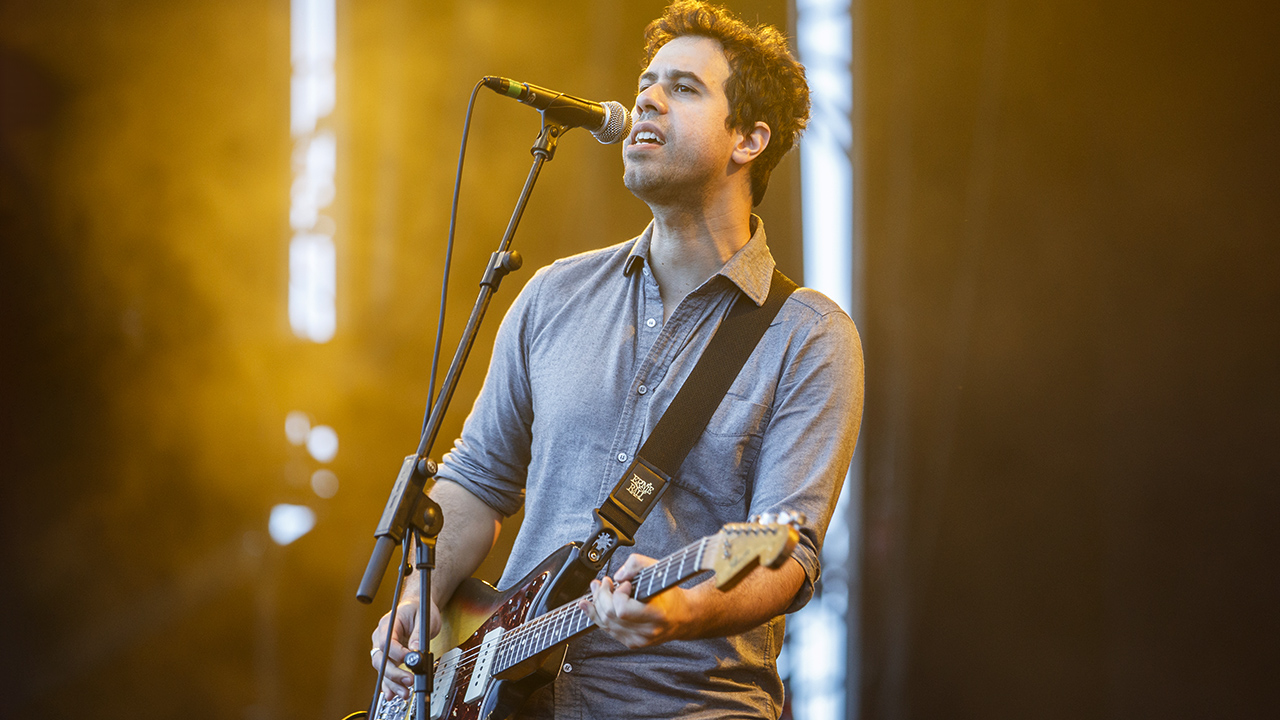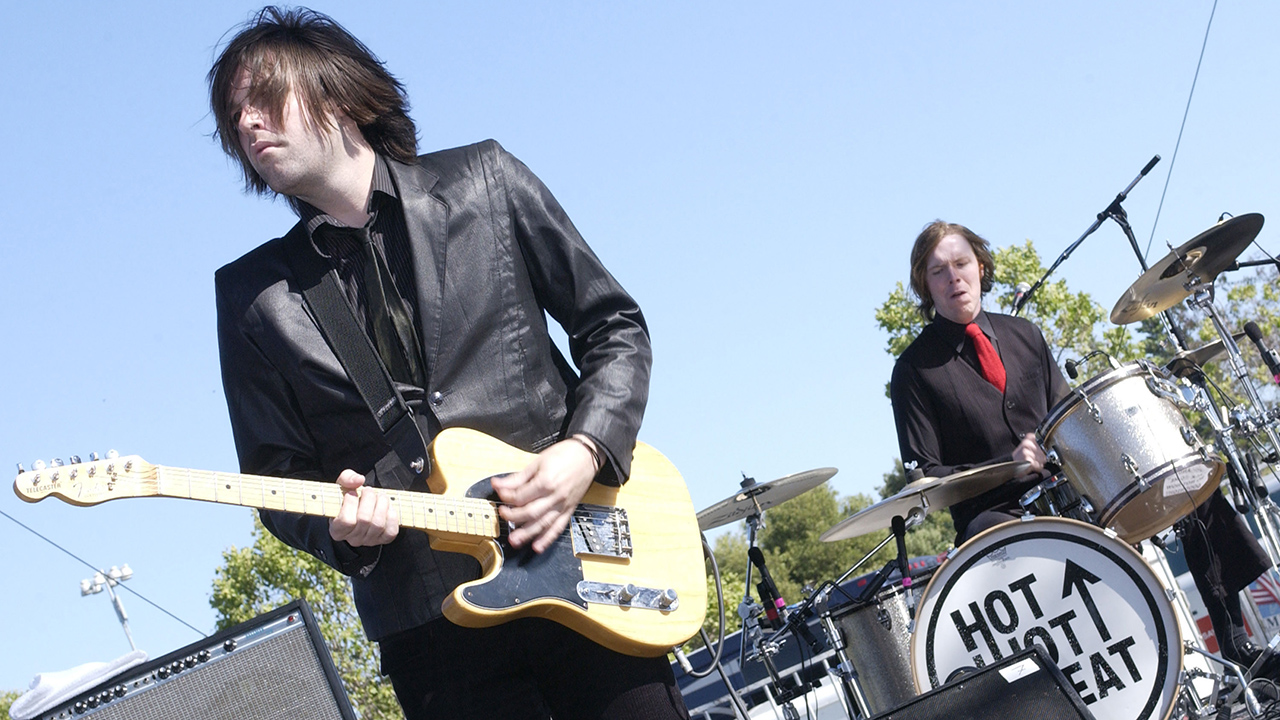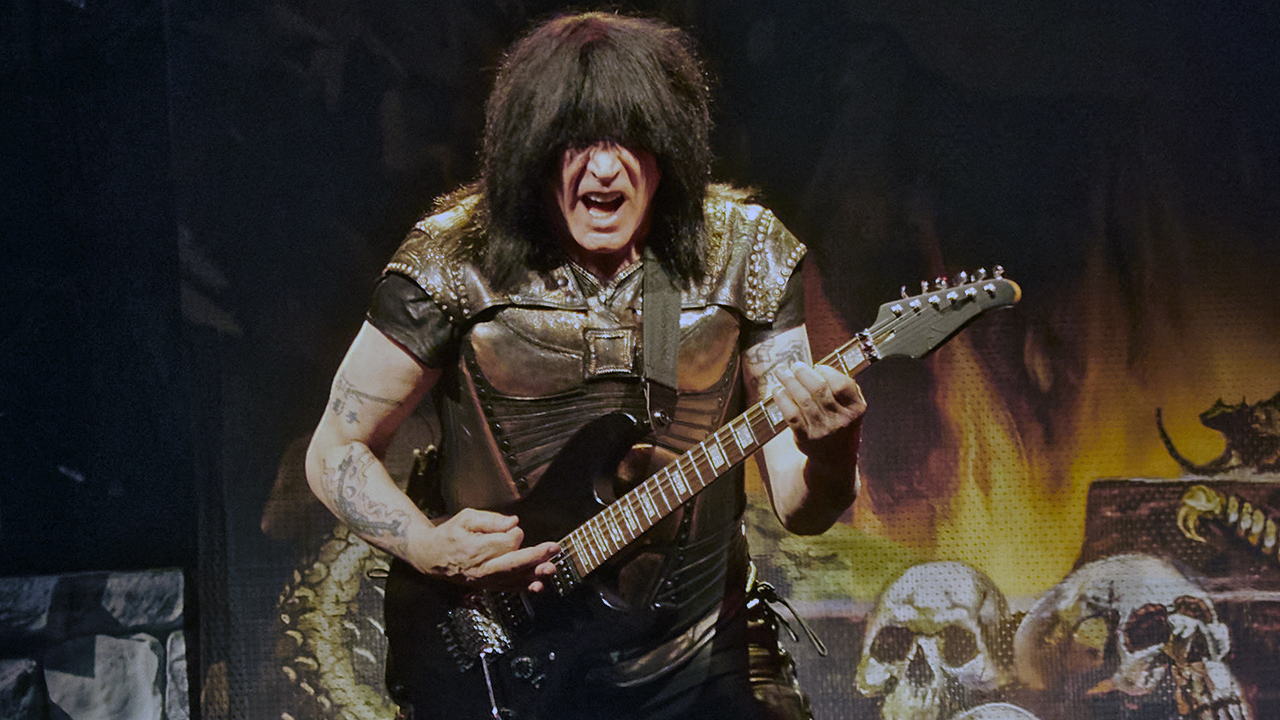“I never really loved just playing chords. They eat up so much space, sonically and rhythmically. Doing things that were sparse was more effective to me”: Dante DeCaro on firing up his Jazzmasters for his Hot Hot Heat return
The reissue of the Canadian pop-rock quartet’s Make Up the Breakdown led to surprise new single Shock Me, and there’s more to come, says the Wolf Parade guitarist

All the latest guitar news, interviews, lessons, reviews, deals and more, direct to your inbox!
You are now subscribed
Your newsletter sign-up was successful
When Guitar World makes the call to Hot Hot Heat guitarist Dante DeCaro, he’s handling heavy lumber – but it’s not his vintage Jazzmaster, which fires out hummably haunting high-string melodies through a fog of plugin-distressed distortion.
Instead, the conversation regarding the recently reunited Canadian pop-rockers’ surprise single, Shock Me, takes place as DeCaro is lugging and installing shelves into his Shawnigan Lake, British Columbia home studio.
“When I first started doing it, I called it Deadwood because it was built out of an old barn with old wood,” he explains. “But then that TV show came out and I felt like people were going to think I named it after the show, so I just started calling it The Studio.”
The single arrives seven years after Hot Hot Heat called it quits, and nearly two decades since DeCaro had exited the lineup. But after they reconnected for last year’s 20th anniversary edition of Make Up the Breakdown – their dance-punk-pulsing breakthrough featuring quirked-up tunes like Bandages – they wondered if they could give things another crack.
DeCaro, who’d already been working on some darkly danceable demos, recalled being a little confused when he first joined in 2001. They’d been rumbling through the West Coast Canadian music scene with hardcore aplomb and not a guitar in sight, instead driving tunes through Steve Bays’ Roland Juno-6 keyboard, drummer Paul Hawley’s manic rhythms, and Dustin Hawthorne’s jagged bass work.
A line-up shift introduced DeCaro to the mix, not to mention classic pop and post-punk sensibilities. The throatiness of founding howler Matty Marnik was replaced by Bays’ uniquely warbly, even campy vibrato vocal style.
DeCaro’s affinity for Drums and Wires-era XTC informed pieces like Le Le Low with a mixture of plinking, percussive texturing, fluid chord voicings and impeccable hookiness.
All the latest guitar news, interviews, lessons, reviews, deals and more, direct to your inbox!
The reimagined popsmiths initially struggled through a series of underwhelming D.I.Y. tours before their fortunes changed around the time a donation cup was filled to the brim after playing a Las Vegas coffee shop. The openers were a little local band called The Killers; the groups would end up touring together.
Hot Hot Heat caught the attention of Sub Pop Records for 2002 EP Knock Knock Knock; and that same fall they dropped Make Up the Breakdown, which led to a major label re-release via Sire. All of a sudden, wiry guitar rock was blowing up through the rise of similarly minded bands like the Strokes and the Rapture, putting Hot Hot Heat’s music in good company.
“It wasn’t just that our career was suddenly moving at warp speed – it was music itself,” DeCaro says of the early ‘00s. “Rock music had this sudden shift, and we were right in the middle of it.”
Despite blowing up internationally, he left Hot Hot Heat as they wrapped recording sessions for 2005’s Elevator, citing a near-constant tour schedule and creative tensions as reasons for his departure. He went on to continued acclaim as an off-and-on member of indie rockers Wolf Parade.
These days DeCaro is happily living low-key on the Island – but he’s plenty stoked to be back with his old Hot Hot Heat bandmates.
How did Shock Me come about?
“When we started talking about doing stuff again, our main interest was, ‘We’re only going to do this if we have sweet new material.’ I had actually made a demo of the song, and I remember thinking it could be a Hot Hot Heat song. We’d thrown a few ideas out when we got together to record [at Bays’ studio in Greater Vancouver], and that was the one we settled on.”
It feels like it plays to the darker side of Hot Hot Heat – how did you develop the guitar work on this one?
“Hot Hot Heat does a few things pretty well, and that’s one of the things: dark, yet upbeat, and danceable. There’s going to be poppier stuff.
“What can I say about the guitar on this particular one? I really winged it! For the demo I just programmed a drum beat on an MPC, synced it to a Roland Juno-6 – which is fitting – and started jamming to that rhythm.
“I ended up with three or four ways of doing the melody line. One of them is thrashing an A minor chord; and there’s a couple of melodic parts following the vocals. For the most part, that song is a single chord. I just tried different ideas until they sounded cool. That’s something I typically do.”
What are you playing?
“This is the first time in my life that we took a DI’d guitar signal. There is a little bit of my original guitar demo, because it was done to a click, but most of the guitar is this DI’d signal. I honestly don’t even know what Steve did with it.
“On my rig nowadays I have a couple of really nice ‘60s Jazzmasters that I lucked into over the years. Usually I’ve got the Moogerfooger analog delay; it has a little drive circuit in it, so often that’s the extent of my distortion.
This is the first time in my life that we took a DI’d guitar signal… I honestly don’t even know what Steve did with it
“I either go through an old Fender Showman into an Alnico JBL 1x15 – I love the 15-inch Alnico speakers they used to put in amps back in the day – or a ‘57 tweed Deluxe with a little 10-inch Alnico. That one’s too quiet to play in a band, but it’s amazing for recording.
“In Wolf Parade, I was doing the Showman with the 1x15 as my guitar tone, with a Moogerfooger.”
How much did the 20th anniversary edition of Make Up the Breakdown got the dialogue going for this reunion?
“It was the catalyst. I hadn’t listened to that record in like 20 years, but some friends of mine I was working with wanted to hear it, and I was begrudgingly like, ‘Okay, we can listen to it at work.’ I totally fell in love with it – rediscovered it. And then the re-release came out shortly after. My love for it only grew.
Was there anything in your playing that surprised you, 20 years after the fact?
“I’d hate to come across as pompous, but I was fairly impressed with myself, being so young at the time – not necessarily the physical ability or prowess, just really appropriately-written parts that helped moved the songs along.
“We wrote in jam spaces really quickly, but we were definitely thinking about the arrangement of the songs. It really paid off, because it’s a nicely crafted chunk of music.”
Before you joined the lineup, Hot Hot Heat was more of a keyboard-driven hardcore band – there wasn’t even a guitar player on their earliest EPs. What do you remember about getting connected with these guys?
It was totally different and exciting. Then all of the sudden they wanted me to play guitar. I was like, ‘But you guys sound great already!’
“It was intimidating because I was such a fan of them before I was in the band. I’d been playing guitar for a few years by that point. I started out learning Nirvana and Beatles songs – mainstream stuff – but I got sick of that quickly, and wanted to see what other kind of things you could do with guitar.
“I started listening to ‘80s stuff first, and one of the bands that ended up being a clear influence on my playing was XTC. Then I got into Victoria’s underground punk scene, which I felt was the only place where interesting things were happening locally.
“There’d been those guitar-based emo punk bands, but even then I got kind of bored – until I saw Hot Hot Heat. It was just crushing keyboards, drums and bass. It was totally different and exciting. Then all of the sudden they wanted me to play guitar. I was like, ‘But you guys sound great already!’ What the fuck could I do?!”
Did you ever try to reinterpret those early bass-and-keyboard songs with guitar?
“We did play some of those songs for a little while. The biggest barrier was not having the original singer. Steve was singing and playing keyboards, and he was such a different kind of singer.
“As for me putting guitar on them, I remember having a lot of trouble finding something that fit. The songs were done – they didn’t need guitar. It was just extra notes. I wasn’t really able to develop much based on that sound with a guitar ever.”
How long did it take for the new lineup/direction to gel?
“That was a process. Steve and Paul are really fearless with music – Paul loves the Beatles; Steve loves really melodic music like that, too – but I was shocked how far they wanted to depart from what the band had been doing.
“We tried things like So Horrible. I could never really get into that song – it’s something we still joke about to this day, like, what the fuck were we thinking?
I never really loved just playing chords. They eat up so much space, sonically and rhythmically
“The point where it locked for me was the song Le Le Low. It was chords and melody, but the drum beat on that song is a little herky jerky; the guitar is these stabs; the bass is almost getting into disco, really following the drums. But the song remained melodic.”
Staccato guitar rhythms are all over this era — Talk to Me Dance With Me off Make Up the Breakdown also has that danceable, stabbing edge to it, for instance. How did you end up developing that side of your playing?
“These decisions were made automatically, but I never really loved just playing chords. They eat up so much space, sonically and rhythmically. So doing things that were sparse was more effective to me.
“Something like Le Le Low, it’s a three-chord verse – it’s Emin, D, and Bmaj7. I think Paul had written the chords, but I modified them to these different voicings, and did it with those stabs, which led to this new rhythmic approach. Mostly, I liked leaving a lot of space. I keep doing that same trick over and over.”

You recently made a playthrough video of Middle of Nowhere for the band’s Instagram account, reminiscing on the origins of the song, its chord changes and whatnot. Are there any other quintessential guitar moments on those early records?
“The first thing that comes to mind is Make Up the Breakdown’s Get In or Get Out, which I have long felt was the strongest song on that record. It was never a single, but it should have been.
“Again, it’s just Beatles-y chords, if you think about it – but it’s a perfect example of my approach to playing in that band. You can do those chords any way you want to. In one verse I’ll do it one way, and the next verse in another.
All of a sudden what sounded discordant in minor sounds lovely in the major key… Little tricks like that that came to us when were 21 years old
“There’s another really neat thing on Naked In the City Again, the first song on that record, where we do a key change. It starts off in a minor key. Then it gets into this breakdown and I do a little discordant three-note chord in little stabs.
“I stay on those notes, but in the background the organ shifts from minor to major, and all of a sudden what sounded discordant in minor sounds lovely in the major key – it turns into a major with a minor seventh.
“Little tricks like that that came to us when were 21 years old… I think that’s pretty impressive! It’s so long ago now that I feel like I’m talking about a different person.”
How different was your rig back then?
“I’ve still got it here at the studio. It was this silverface Twin – pre master volume, so it’s either a ‘69 or ‘70. I bought it with the student loan I got while going to college.
“I don’t even know if I had my own guitar at the time. Paul happened to have a classic 1970 Deluxe Les Paul, so he was like, ‘You can use this!’ That’s a really good guitar – like Slash’s guitar, that kind of thing – but I never really loved playing a Les Paul. It never suited me.
“Eventually I got this Telecaster, which is relic’d. It’s sort of a corny idea, like distressed jeans, but they were just made better than any other guitar Fender was making at the time. They made them with the old specs and with the best wood. That guitar is great; I still use it. I also had a tremolo pedal and a delay pedal. Really barebones.”
After leaving Hot Hot Heat you ended up playing with Wolf Parade, you had a stint playing bass with Blackout Beach, and you did your Johnny and the Moon solo project. What makes Hot Hot Heat special?
“Hot Hot Heat completely stands out from any other musical project I’ve played in. With Blackout Beach, I felt like I had a pretty small role – a temporary bass player. I really enjoyed that, but I forget sometimes that I was in the band.
“Plus, I was playing bass. I’d also played a bass about a third of the time in Wolf Parade. At first, I just played it like a big dumb guitar, but I got into it as a rhythm instrument. All of these things were awesome. I got to become a better musician and experience playing with a wider range of people.
The sky really is the limit… ‘You want to make a metal record? We can do that. You want to sign to major label? We can do that’
“But Hot Hot Heat is different. The sky really is the limit with Steve and Paul. We could do anything. ‘You want to make a metal record? We can do that. You want to sign to major label? We can do that.’ It just has this extra level going on. I’m really grateful for the opportunity to do it again.”
What else is coming up?
“We don’t have a plan to release an album or anything, but we’re going to be getting together periodically, putting out music or playing the odd show. Again, it’s all kind of new – but the sky is the limit.”
Gregory Adams is a Vancouver-based arts reporter. From metal legends to emerging pop icons to the best of the basement circuit, he’s interviewed musicians across countless genres for nearly two decades, most recently with Guitar World, Bass Player, Revolver, and more – as well as through his independent newsletter, Gut Feeling. This all still blows his mind. He’s a guitar player, generally bouncing hardcore riffs off his ’52 Tele reissue and a dinged-up SG.

